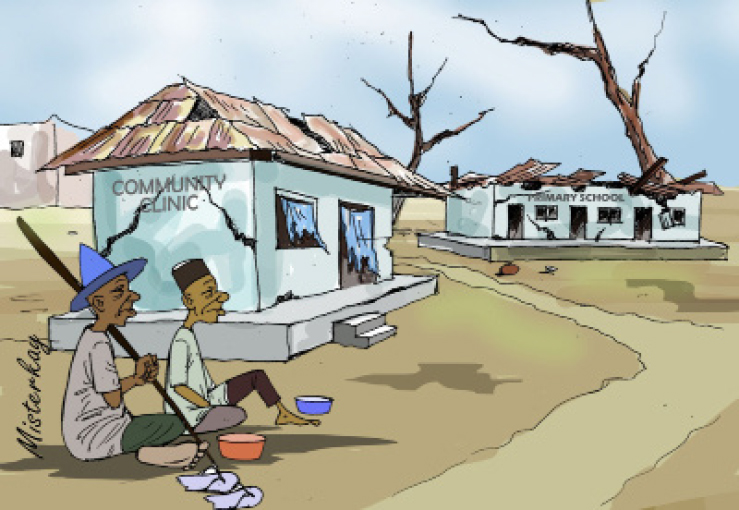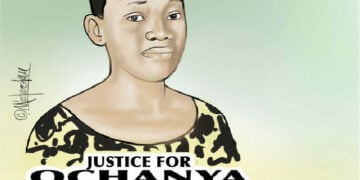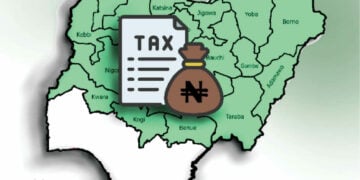Northern Nigeria stands at a critical juncture, where the winds of change beckon, and the possibilities for transformation are vast. Yet, the region grapples with entrenched poverty, limited access to education, and inadequate healthcare. The narrative is not new, but the urgency for change has never been more pronounced.
Two years ago, a report by the National Bureau of Statistics highlighted this stark reality: Northern states rank among the poorest in Nigeria, according to the Multidimensional Poverty Index (MPI). The MPI measures various deprivations at the household level in health, education, and standard of living, painting a grim picture of the region’s socio-economic conditions. States such as Sokoto, Taraba, and Jigawa consistently top the list of Nigeria’s poorest, illustrating the depth and breadth of poverty in Northern Nigeria. This enduring poverty is exacerbated by low literacy rates, with many children out of school, and inadequate healthcare services, leading to high maternal and infant mortality rates.
To envision a future where Northern Nigeria transcends these challenges, we must consider various scenarios – each represented by a bird, symbolizing different paths the region might take. These scenarios – Possible, Plausible, Probable, and Preferable – offer insights into potential futures and guide our actions today.
Ostrich: The Possible Scenario
In this scenario, Northern Nigeria mirrors the ostrich – burying its head in the sand, ignoring the pressing issues, and maintaining the status quo. Here, poverty remains pervasive, and economic stagnation continues. Governance structures are riddled with corruption, and short-term political gains overshadow long-term developmental goals. Education and healthcare systems are underfunded, with limited improvements in infrastructure and quality.
The ostrich scenario unfolds with leaders clinging to power through patronage and populism, sidelining critical reforms. External aid and investments dwindle as confidence in the region’s stability wanes. The youth, disillusioned by the lack of opportunities, either migrate to other regions or succumb to the lure of extremist groups. Social tensions rise, exacerbated by ethnic and religious divides.
Despite occasional attempts at reform, systemic issues remain unaddressed. International organizations and local NGOs continue to provide relief, but their efforts are mere band-aids on deep-seated wounds. The ostrich scenario is a stark reminder of what could happen if complacency prevails, and it underscores the urgent need for proactive measures.
Duck: The Plausible Scenario
The duck scenario represents a cautious and steady approach. Northern Nigeria, like a duck gliding on water, appears calm on the surface but paddles vigorously beneath. In this future, incremental progress is made, but it is uneven and slow. Governance sees modest improvements, with some leaders embracing transparency and accountability, yet old habits die hard.
Economic diversification begins to take root, with investments in agriculture, small-scale manufacturing, and renewable energy. However, these sectors face challenges such as inadequate infrastructure, limited access to credit, and bureaucratic red tape. Education reforms lead to higher enrollment rates, but quality remains a concern, particularly in rural areas. Healthcare access improves marginally, with new clinics and hospitals, yet they are often understaffed and under-resourced.
The duck scenario sees Northern Nigeria making strides, but the progress is fragile. Political will fluctuates with changing administrations, and policy continuity is rare. Community-driven initiatives gain traction, but they struggle to scale up without robust institutional support. The region avoids the worst outcomes of the ostrich scenario, but it falls short of unlocking its full potential.
Eagle: The Probable Scenario
The eagle scenario envisions a Northern Nigeria that rises to new heights through strategic vision and determined action. This future sees a significant overhaul of governance structures, driven by a new generation of leaders committed to integrity, inclusivity, and sustainable development. Anti-corruption measures are strictly enforced, and public trust in government institutions is restored.
Economic revitalisation takes center stage, with substantial investments in infrastructure, technology, and education. Agriculture remains a backbone, but it is modernised through mechanisation, improved supply chains, and market access. Renewable energy projects flourish, reducing reliance on fossil fuels and creating new jobs.
Education and healthcare systems receive comprehensive reforms, focusing on quality and accessibility. Teacher training programs, digital learning initiatives, and vocational training equip the youth with skills for the future. Healthcare delivery is enhanced through telemedicine, mobile clinics, and partnerships with international health organisations.
The eagle scenario is propelled by a collective vision of progress, resilience, and innovation. While challenges persist, such as occasional political instability and regional disparities, the region is on a path to sustainable development. Northern Nigeria becomes a model for other regions, demonstrating that with the right policies and leadership, transformation is possible.
Phoenix: The Preferable Scenario
In the phoenix scenario, Northern Nigeria undergoes a profound renaissance, rising from the ashes of its past struggles to create a future of unparalleled prosperity and harmony. This scenario is characterized by visionary leadership, radical reforms, and a united commitment to shared goals.
Governance in this future is marked by unparalleled transparency, accountability, and citizen engagement. The political landscape is transformed, with leaders prioritizing long-term development over short-term gains. Grassroots movements and civil society organizations play a crucial role in shaping policies and holding leaders accountable.
Economic diversification reaches its zenith, with a thriving mix of agriculture, manufacturing, technology, and services. Northern Nigeria becomes a hub for renewable energy, leveraging its natural resources to power industries and homes sustainably.
Education is reimagined, with universal access to high-quality schooling and higher education. Innovative teaching methods, cutting-edge technology, and a focus on critical thinking and creativity prepare the youth for global competitiveness. Healthcare becomes a model of excellence, with universal coverage, advanced medical facilities, and community health programs ensuring no one is left behind.
Social cohesion strengthens as ethnic and religious divides are bridged through inclusive policies and community-building initiatives. Women and marginalized groups play prominent roles in leadership and decision-making, fostering a culture of equality and respect.
The phoenix scenario is the epitome of what Northern Nigeria can achieve. It represents the highest aspirations and the realization of its vast potential. This future is not just possible but preferable, serving as a beacon of hope and inspiration for the entire nation.
Redefining Politics, Policy, Governance, and Development
These scenarios – ostrich, duck, eagle, and phoenix – provide a spectrum of potential futures for Northern Nigeria. They are not mere stories but reflections of the choices the region’s elites make today. For the region to soar like an eagle or rise like a phoenix, a fundamental rethinking of politics, policy, governance, and development is imperative.
The region’s political elites must embrace a vision beyond personal and partisan gains. They must prioritize integrity, transparency, and accountability, ensuring that governance serves the people. Policies should be evidence-based, inclusive, and forward-thinking, addressing both immediate needs and long-term goals.
There must be a concerted effort to diversify the economy. Investment in education, healthcare, and infrastructure is crucial, but so is fostering innovation and entrepreneurship if jobs are to be created.
Governance structures need reform. Decentralization would empower local governments and communities, allowing for tailored solutions that address specific local challenges. Civic engagement and participation would have to be encouraged, ensuring that development initiatives reflect the voices and needs of the people.
In closing, the future of Northern Nigeria is not predetermined. It will be shaped by actions, decisions, and collective will of the region’s elites. By envisioning and striving for the phoenix scenario, they would be able to transform the region into a beacon of hope and prosperity.
Some quotes that summarise the write-up
“Despite occasional attempts at reform, systemic issues remain unaddressed. International organizations and local NGOs continue to provide relief, but their efforts are mere band-aids on deep-seated wounds.”
“These scenarios – ostrich, duck, eagle, and phoenix – provide a spectrum of potential futures for Northern Nigeria. They are not mere stories but reflections of the choices the region’s elites make today.”
“The future of Northern Nigeria is not predetermined. It is shaped by actions, decisions, and the collective will of the region’s elites.”
“Northern Nigeria stands at a critical juncture, where the winds of change beckon, and the possibilities for transformation are vast. Yet, the region grapples with entrenched poverty, limited access to education, and inadequate healthcare.”





